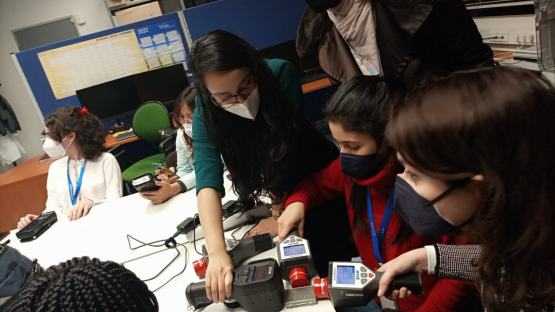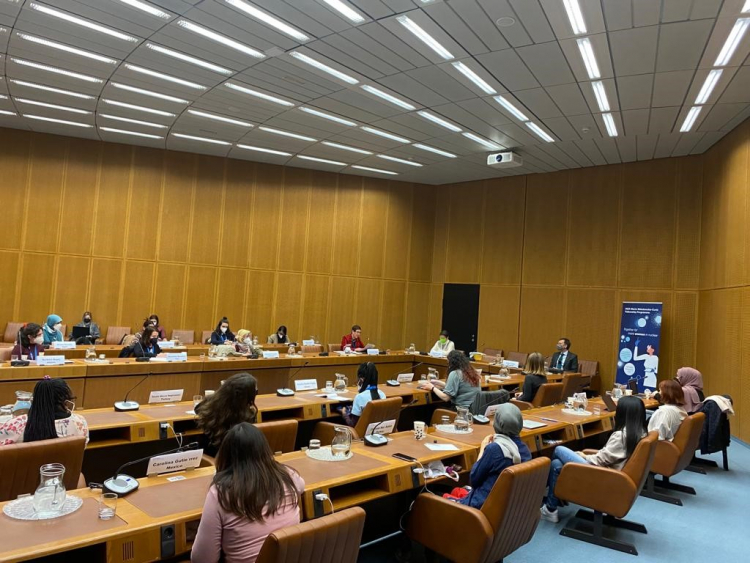The IAEA’s Women in Nuclear Security Initiative (WINSI) is joining forces with universities in Egypt, Germany, India and the United States of America to empower and attract more young women to pursue studies and careers in nuclear security, and increase the representation of women in this field.
“These webinars, which will be conducted jointly by WINSI and universities across the globe will provide more opportunities for networking and knowledge-sharing. Potentially, this collaboration will also contribute to attract more young women to pursue studies in nuclear security,” said Elena Buglova, Director of the IAEA Division of Nuclear Security.
WINSI has planned, jointly with the universities, to conduct quarterly webinars this year to highlight the key role of education in addressing the gender equality gap in the field of nuclear security globally. Each webinar will provide a unique opportunity to learn about existing nuclear security education programmes in a specific region of the world as well as about the assistance the IAEA can offer to countries in this field.
The goal is to establish an international forum where participants can learn and connect with academics, nuclear security professionals, policy makers and NGOs from around the world.
Amity University in India and WINSI hosted the first webinar on 7 March, by inviting experts and students from across Asia and the Pacific to share experiences and discuss how the regional nuclear security educational programmes contribute to the increase of women representation in this field.
Attendees heard perspectives from India, Japan and the Republic of Korea and learned more about the role and work of the IAEA and the Women in Nuclear Southeast Asia (WiNSEA) network for gender equality. The presentations, as well as the discussions during the Young Generation Perspectives Panel, highlighted some of the challenges women still face: a lack of outreach programmes to raise awareness about nuclear security education and career opportunities among young people, the work environment, the reluctance to apply for leadership positions and societal perceptions about women’s role in this field. Among the suggestions made were to focus more on awareness raising at high school level to educate girls about the importance of nuclear security and the opportunities it offers.
The second webinar will focus on nuclear security education opportunities in the Americas, and will be hosted by Purdue University in the U.S. and WINSI. Mansoura University in Egypt will cohost the event in the third quarter of 2022 and the Hertie School in Germany will co-organize this year’s final event.
Here are some insights from universities’ professors, who are collaborating with WINSI in organizing this webinar series:
Alpana Goal, Director & Head Amity Institute of Nuclear Science & Technology, Amity University, Noida, India
“Women have been actively contributing in frontline research and development of various advanced technologies in the nuclear domain, especially in nuclear security. Nuclear security needs the participation from both men and women; it is important to understand the challenges faced by women in achieving their goal.”
Jason Harris, Director, Center for Radiological and Nuclear Security (CRANS), Purdue University, United States of America
“What is needed for achieving not only gender balance, but also gender equality, is more support and mentorship for women in all stages of their education. Speaking specifically about higher education, I am proud to be part of a university and college that is making a concerted effort to create a positive culture of diversity, equity, inclusion and belonging. If we all do similar things, no matter how small, we can make a huge difference in achieving gender equality across the world. To slightly modify the quote of a famous alumnus of my university, astronaut Neil Armstrong and first person on the moon, “Small steps, that we all take together, can lead to a giant leap for humankind.”"
Mohamed Salah, Professor of Theoretical and Radiation Physics, Mansoura University, Egypt
“In the context of sustainable development and globalization, empowering female scientists is necessary. Gender equality in nuclear security provides for more opportunities for fruitful and productive collaboration.”
Marina Henke, Professor of International Relations and Director of the Centre for International Security, Hertie School, Germany
“Nuclear security is once again a topic of great concern to Germany, Europe and the international community. It is therefore of great importance that we ensure that the best minds tackle these complex challenges by bringing as many diverse perspectives and backgrounds as possible into the field. Unfortunately, women continue to be underrepresented in nuclear security. Our own Master in International Affairs at the Hertie School has diversity at its core and extensive mentoring sessions help to illuminate different career perspectives in international and nuclear security.”






